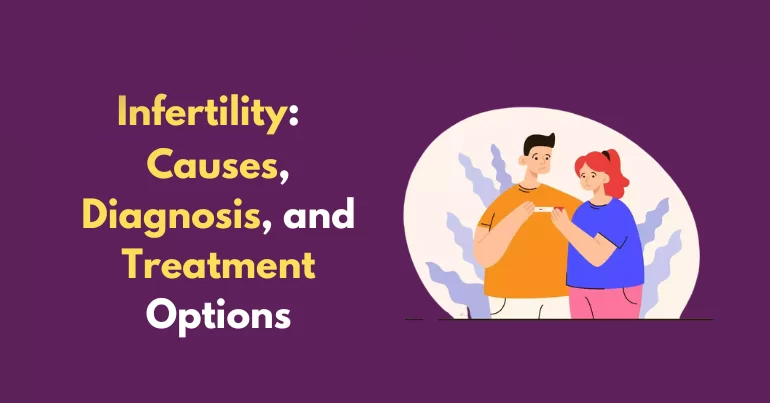Infertility: Breaking the Silence and Finding Hope
Infertility is often a taboo subject that many couples struggle with in silence. Whether you’ve been trying to conceive for months or years, the emotional toll can be significant. However, it’s important to know that infertility is a medical condition, and seeking help is the first step toward addressing it. In this blog, we will explore what infertility is, its causes, the diagnostic process, and the wide range of treatments available to help you achieve the family you’ve always dreamed of.
What is Infertility?
Infertility is defined as the inability to conceive after one year of regular, unprotected intercourse. If the woman is over 35, this period is shortened to six months. Infertility can be the result of various factors, either in the male or female reproductive system, or a combination of both. It’s important to note that infertility doesn’t mean a couple can’t have children—it simply means they might need some help to conceive.
Common Causes of Infertility
Infertility affects millions of couples around the world. Here’s a breakdown of some of the common causes for both men and women:
In Women:
-
Ovulation Disorders:
- Conditions such as Polycystic Ovary Syndrome (PCOS) and hypothalamic dysfunction can interfere with ovulation, making it difficult for the woman to release an egg.
-
Fallopian Tube Blockages:
- Fallopian tubes can become blocked due to pelvic infections, past surgeries, or conditions like endometriosis, preventing the egg and sperm from meeting.
-
Endometriosis:
- A condition where tissue similar to the uterine lining grows outside the uterus, causing scarring that can obstruct the fallopian tubes or damage the ovaries.
-
Uterine Problems:
- Conditions such as fibroids, polyps, or congenital uterine abnormalities can affect embryo implantation, leading to infertility.
-
Age:
- A woman’s fertility naturally declines with age, especially after the age of 35, due to a decrease in the quantity and quality of her eggs.
In Men:
-
Sperm Abnormalities:
- Problems such as low sperm count (oligospermia), poor sperm motility (asthenozoospermia), and abnormal sperm shape can reduce the likelihood of successful fertilization.
-
Varicocele:
- A varicocele is a swelling of veins in the scrotum that can affect sperm quality and fertility.
-
Hormonal Imbalances:
- Hormonal disorders can affect sperm production and quality, leading to infertility.
-
Infections:
- Past infections, including STIs, orchitis (testicular inflammation), and epididymitis, can lead to infertility.
-
Genetic Factors:
- Genetic conditions like Klinefelter syndrome or Y chromosome microdeletions can affect sperm production.
-
Lifestyle and Environmental Factors:
- Factors such as smoking, excessive alcohol consumption, drug use, stress, and exposure to environmental toxins can all impact male fertility.
How is Infertility Diagnosed?
To determine the cause of infertility, both partners need to undergo a series of diagnostic tests. Here are some common methods used for diagnosing infertility:
-
For Women:
- Blood Tests: Hormone tests help evaluate ovulation and ovarian reserve, including tests for FSH, LH, estrogen, and progesterone.
- Ultrasound: Used to check the ovaries, uterus, and fallopian tubes for abnormalities like cysts, fibroids, or blockages.
- Hysterosalpingography (HSG): A test that evaluates the patency of the fallopian tubes and checks for blockages or abnormalities in the uterus.
- Laparoscopy: A minimally invasive surgical procedure used to diagnose conditions such as endometriosis, scar tissue, and other reproductive system abnormalities.
-
For Men:
- Semen Analysis: The most common test to check sperm count, motility, and overall quality.
- Blood Tests: Hormonal evaluations can help determine if any imbalances are affecting sperm production.
- Genetic Testing: In cases of unexplained male infertility, genetic testing may be recommended to look for conditions like Klinefelter syndrome or other genetic abnormalities.
Treatment Options for Infertility
Once the underlying cause of infertility is identified, a variety of treatments can help increase the chances of conception. The choice of treatment depends on the cause, severity, and individual circumstances of both partners.
For Women:
-
Ovulation Induction:
- Medications like Clomiphene Citrate and Gonadotropins help stimulate the ovaries to release eggs, especially for women with ovulation disorders like PCOS.
-
Intrauterine Insemination (IUI):
- In IUI, sperm is directly injected into the uterus during the woman’s ovulation period to increase the chances of fertilization.
-
In Vitro Fertilization (IVF):
- IVF is one of the most common fertility treatments, where eggs are retrieved from the ovaries, fertilized outside the body, and then implanted into the uterus.
-
Surgical Treatments:
- For women with endometriosis, fibroids, or fallopian tube blockages, surgery may be required to remove the obstruction or correct abnormalities.
-
Egg Donation or Embryo Adoption:
- For women who can’t produce healthy eggs, donor eggs or embryo adoption can be used in conjunction with IVF.
For Men:
-
Lifestyle Changes:
- Improving diet, quitting smoking, reducing alcohol consumption, and managing stress can help improve sperm quality.
-
Medications:
- Hormonal treatments like Clomiphene Citrate and Gonadotropins can help improve sperm production.
-
Surgical Interventions:
- Varicocelectomy (removal of varicocele) and Vasovasostomy (vasectomy reversal) can improve fertility in some men.
-
Assisted Reproductive Technologies (ART):
- Intracytoplasmic Sperm Injection (ICSI) is a technique used in IVF, where a single sperm is injected directly into the egg for fertilization, typically used for severe male infertility.
- Sperm Donation: When sperm is not viable, donor sperm can be used in fertility treatments like IVF.
Coping with the Emotional Impact of Infertility
Infertility is not just a physical challenge but an emotional one as well. The stress and emotional toll can affect both partners in different ways. It’s essential to acknowledge and address the emotional impact infertility can have on your relationship, mental health, and overall well-being.
Seeking emotional support from a counselor, joining support groups, and discussing your feelings openly with your partner can provide comfort and strength during this challenging time. Many fertility clinics also offer counseling services that specialize in helping individuals and couples cope with infertility.
Conclusion: There is Hope
Infertility can be a tough journey, but it’s important to remember that medical advancements have opened doors to numerous treatment options that can help you build the family you desire. Whether through medication, surgery, or assisted reproductive technologies, infertility is treatable, and there’s hope for success.
If you and your partner are struggling with infertility, don’t hesitate to reach out for help. Our experienced team of specialists can provide guidance, support, and treatment options tailored to your unique needs.




